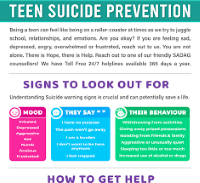By Andrea Naicker
The teenage phase is some of the most transformational years of an individual’s life. It can be an exciting period of self-discovery but also an overwhelming time for some, which can unfortunately lead to self-harm.
Often times the challenges teenagers face are compounded by difficulties that are beyond their control such as health issues, challenges at school, family and social problems.
This can lead teenagers to suffer from depression and anxiety leaving them feeling helpless and resorting to suicide. Whatever the reasons that lead to an individual taking their own life, we cannot afford to turn a blind eye as children’s lives and the future of our nation are at stake.
It is deeply concerning that suicide is one of the leading causes of death among young people. In creating awareness around this challenge and seeking solutions for our youth, our country every year marks Teenage Suicide Awareness Week in February.
This week is aimed at identifying warning signs of suicide in youth, reducing stigma and encouraging help seeking behaviour, including open conversations that empower teenagers to speak out about their challenges.
Government partners with organisations such as South African Depression and Anxiety Group (SADAG) to raise awareness, provide material and support for those at risk of depression and suicide.
Mental healthcare professionals from SADAG encourage open conversations and offer support for people who feel alone. Young people are encouraged to reach out to SADAG via WhatsApp 076 882 2775 or call 0800 567 567 for counselling.
Individuals can also make use of the National Toll-Free Suicide Crisis Line on 0800 567 567 or Lifeline on 0861 322 322. Help is also available to children at Childline SA by dialling 116 from a cellphone.
Overcoming the challenge of teenage suicide also relies on the cumulative efforts of parents, friends, families and faith organisations to play an active role by listening to children with empathy, kindness and taking their challenges seriously.
The explosion of social media has exposed our nation’s teenagers to more influences than ever before. They are consistently bombarded with picture perfect images and lifestyles that influence their view of life. These constant comparisons can lead to self-esteem and identity issues, and harmful behaviour.
Furthermore, the prevalence of cyber bullying, where individuals are harassed and bullied online, adversely impacts the mental state of our young people. While there are reporting mechanisms on social media, more is required to put an end to online harassment.
We therefore encourage parents to monitor their children’s exposure to social media platforms and the online communities to which they belong. This will help support, safeguard and protect the mental well-being of our young people. Parents are also advised to cultivate homes where bullying and violence is not tolerated, especially since bullying is still a troublesome issue in schools.
The police are partnering with schools to enhance safety in schools through linking schools with local police stations and establishing functional school safety committees. To promote school safety, a National School Safety Framework has been established to manage risks and threats of violence in schools.
A national strategy for the Prevention and Management of Alcohol and Drug use amongst learners in schools has also been developed to ensure that young people do not turn to alcohol as a coping mechanism. We are confident that through these many interventions we can create the environment for young people to thrive and flourish without undue pressure.
Whilst government strives to ensure safer spaces for our children, we urge every individual in society to play their part and protect our children, for their lives and the future of our nation depends on it.
Andrea Naicker is GCIS Assistant Director: Content Development





